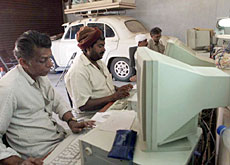
Radios and computers enlisted to reduce poverty

What do a radio station in Sri Lanka, a hospital in Mali and an email centre in Samoa have in common?
They are all using information and communication technologies (ICTs) to help improve lives.
Dozens of similar projects will be on display in December in Geneva at an exhibition to coincide with the World Summit on the Information Society (WSIS).
Some 200 organisations and businesses from 80 countries are taking part in the joint exhibition and conference, known as the ICT for Development Platform.
“The core of the summit is the political debate and discussion among heads of state on the future of the information society,” Walter Fust, director of the Swiss Agency for Development and Cooperation (SDC), told swissinfo.
“This platform offers players such as the private sector, NGOs [non-governmental organisations], governments and visitors, an opportunity to look at the trends, what has already been done, where are the market niches and where are the actors who are able to finance or to become potential partners for further development.”
Development projects
Billed as the biggest event ever held on the subject of ICTs for development, the platform will present a wide range of projects, products and services.
“It is intended to act as a market place for ideas, and at the same time serve as a catalyst for new and innovative partnerships and projects,” said Fust.
The platform exhibition area is almost booked out, with the private sector making up around a quarter of the exhibitors.
Participants include Nokia, Hewlett Packard, Swisscom, Toshiba, Sharp, Linux Professional Institute and Panasonic.
High-ranking international bodies from the World Bank to the World Trade Organization are also taking part, and many countries have pavilions at the platform.
Key factors
Fust said three key factors limited the access of poor people to ICTs: infrastructure, content and cost.
“Our partners in Africa have to pay one hundred times more for an hour’s internet use than a student in Geneva,” he said.
Debates, presentations, workshops and exhibitions will examine how villages without electricity can use other forms of energy, such as solar energy, to hook up to the internet.
Participants will also consider the role of community radios in disseminating agricultural knowledge.
“In rural areas, farmers have the prices in advance so they don’t have to walk 15 kilometres to a market and then return with all their merchandise because the price is not right,” said Fust.
Telemedicine
Geneva University Hospital will present telemedicine projects in which it is involved in French-speaking African countries.
Distance learning for universities is another key application.
“Most universities do not have the capacity to absorb the number of students, so there must be new systems developed to provide a way for young people to have access to education,” said Fust.
The ICT for Development Platform is organised by the SDC and the Global Knowledge Partnership,
swissinfo, Vincent Landon
The ICT for Development Platform runs from December 9-13 at Geneva Palexpo.
The platform will be a key side-event to the World Summit on the Information Society.
Some 200 organisations and businesses from 80 countries are participating.
The platform is organised by the Swiss Agency for Development and Cooperation, and the Global Knowledge Partnership.

In compliance with the JTI standards
More: SWI swissinfo.ch certified by the Journalism Trust Initiative





























You can find an overview of ongoing debates with our journalists here . Please join us!
If you want to start a conversation about a topic raised in this article or want to report factual errors, email us at english@swissinfo.ch.